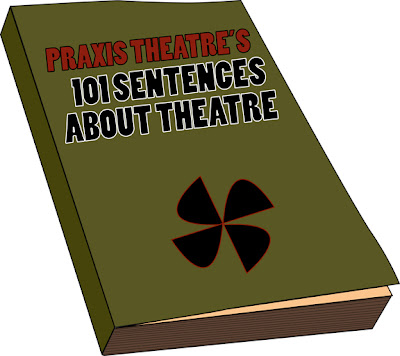Sentences 95-101
95) Where are the new forms of theatre that give way to exciting changes and that shock and titillate?
96) Are we simply recycling bad ideas?
97) The heart of exploring what one bottles up and censors.
98) Theatre is stymied by the fact that it is an insider’s game that rewards connections over merit.
99) Theatre ought to get its game face on, as there is a lot of competition for entertainment dollars.
100) Nobody is going to give you a medal for being poor.
101) Theatre is being comfortable with asking those uncomfortable questions.
Well? That’s it.
Praxis Theatre’s 101 sentences about theatre. Thanks to everyone who contributed to this project, including Andrew Zadel, Danny Waugh, David Galpern, Greta Papageorgiu, Ian Mackenzie, James Murray, Jo Chim, Laura Nordin, Leah Wahl, Meredith Scott, Michael Wheeler, Paul Hardy, Shaun McComb, Simon Rice and Tania McCartney.
And thanks again to George Hunka, whose 95 sentences about theatre was the inspiration behind this project.
Click here for the series introduction and for the complete list of 101 sentences.
So. What are we going to talk about now?



“Theatre ought to get its game face on”? Awesome. You guys mind if I make T-shirts?
I think this is a hell of a list. Well done. It’s really inspiring.
I think you saved the best for last, I love each and every sentence in this section. I’ve noticed a recurring theme throughout this series, the responsibility of theatre to tackle subject matter that shifts its audience out of complacency and into its discomfort zone. 3 sentences in this section alone deal with this. Is this a mandate for the new theatre? Is it new-audience prohibitive or just the kind of thing the public is looking for? How far are we willing to go to be titillating or shocking?
Hey Simon,
Send me a t shirt. I can’t speak for everyone who contributed a sentence, but i think there’s more of a focus on the former (reducing complacency) than the latter (creating discomfort). I’m not sure embracing any of Artaud’s Theatre of Cruelty is going to salvage/re-energize our medium. It should be challenging, but I’m all for people enjoying themselves. That way they come back.
You’re right Mike, I don’t think we should be killing kittens, but what sort of feeling do we want audiences leaving with? I suppose this requires an individual definition of “enjoyment”, which for a lot of people means a happy ending, but I suppose the audience we seek is looking to be challenged, and to be stimulated enough to spur post-play discussion. This is why I think our material right now needs to be topical, to create the easiest link to our audience’s experience. We need to be writing more…
…bonus points for the word “stymied”.
Simon, Mike,
Widespread inter-tribal violence, the environmental catastrophe, the normalization of the abuse of animals, the fact that lawyers make 10,000% more per hour than theatre makers. The growing gap between the haves and the have-nots.
How can we spend our precious art-making time on this earth doing anything but setting the groundwork for a full-scale revolution?
Why should we coddle the status quo if the status quo is happy keeping our art form poor and powerless? Why spend our time perpetuating a tired business model? What are we playing it safe for?
I’m all for infiltrating the mainstream so as to chip away at the system from within. And – sure – let’s make theatre enjoyable. But if we follow that model to its conclusion, we get the splashy Broadway extravaganzas that many of us seem to find so distasteful.
We need a concrete strategy for extracting ourselves from (and staging an attack on) the status quo at the right moments.
You’re right. We’re not at war with our audience. But we need to empower them as allies in our revolution. This doesn’t mean subjecting our communities to abuse in our theatres, but it surely also doesn’t mean pandering to what we think their idea of “entertainment” might be.
Make art the way we want to make it – on our terms. Ask the questions we want to ask. Once we know what we want to say, it’ll be easy to build in the seduction elements that will pack our houses – if widespread influence is the goal.
The revolution in theatre needs to happen at the business end of the stick: an army of Arts Admin rebels so furious with the injustice of the current creaking theatre apparatus that they lead the march to a new model. A model that empowers artists to ask the kinds of questions we need artists to be asking. And theatre can retake its rightful place as a valued moral compass for the communities it serves.
Booyakkacha!
I agree with every ounce of that Ian.
Fuckin’ A. That’s it, I’m blogging that…